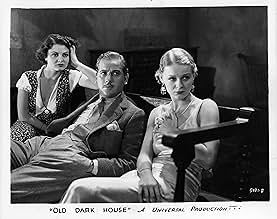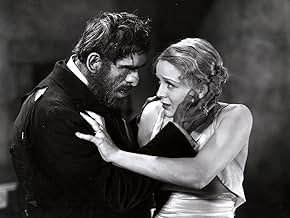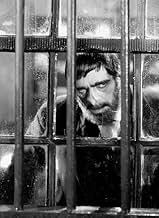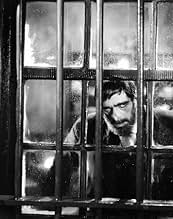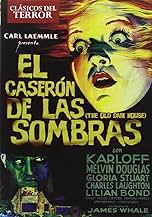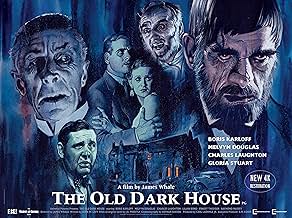VALUTAZIONE IMDb
7,0/10
14.101
LA TUA VALUTAZIONE
Aggiungi una trama nella tua linguaSeeking shelter from a storm, five travelers are in for a bizarre and terrifying night when they stumble upon the Femm family estate.Seeking shelter from a storm, five travelers are in for a bizarre and terrifying night when they stumble upon the Femm family estate.Seeking shelter from a storm, five travelers are in for a bizarre and terrifying night when they stumble upon the Femm family estate.
- Regia
- Sceneggiatura
- Star
- Premi
- 1 candidatura in totale
Recensioni in evidenza
It's a funny experience when a film evokes déjà vu, only to realize the source of the déjà vu is, itself, intended to itself incite déjà vu. Picture this: a miserable storm sweeps a carload of normal people, as earnest as they are bedraggled, into taking refuge at a spooky old manor, only to be besieged and coveted by the prurient, camp Gothic inmates. But don't do the Time Warp again just yet: at the core of this Russian Doll of horror, pastiche, and dark humour lurks James Whale's oft-overlooked but seldom forgotten mini- masterpiece – The Old Dark House. As Poe-faced as if the script had been quoth by the Raven itself, Whale's film is, if not the granddaddy of most horror clichés, then at least the wry, drunken great-uncle. And, weathered as it is, time has been kind to this one, making The Old Dark House a creepy, clever, and sordidly amusing addition to the pantheon of horror classics. Singing not included; pelvic thrusting barely omitted.
If nothing else, The Old Dark House makes for a fascinating transitional tonal touch-point for Whale, one of the defining masters of classical horror. The film isn't as overtly satirical and camp as Whale's later monster mash-terpieces, The Invisible Man and, especially, Bride of Frankenstein, but it certainly shows him creeping in that direction, with a persistent snicker of irreverent naughtiness under its raspy breath. This isn't to say the film is an outright farce - indeed, Whale runs the gamut of thematic leitmotifs that would proceed to become preoccupations for decades of horror to follow: dogmatic religion, lurid sexuality, class discrepancies, and shunned, disabled family members. Yet, his film crackles with an invigorating, nervy energy, and his characters banter with zingy, pre-screwball fury, with several double-entendres pushing the boundaries of Hays Code knuckle-rapping with cheeky aplomb (maybe Whale assumed American censors wouldn't understand them through the Welsh accents?).
His setup is certainly foreboding enough, with the harried car ride prelude across flooding, lightning-scarred Welsh countryside a perfectly ominous amuse-bouche for the sinister, Gothic castle theatrics to come. Whale's flair for atmospheric mise-en-scène is superb, peppering the film with marvelously spooky flourishes and Expressionist lighting keeping the audience biting their nails throughout (one bit, where a woman makes shadow puppets on the wall with her hands, only to have a dark figure emerge from the shadow, is a jump scare for the ages). But Whale bides his time, keeping his pacing cunningly slow and allowing his film to froth at the mouth with looming tension.
Whale's film is also remarkable for the unprecedented access the audience is given to his cabal of characters. Too many horror films introduce characters as disposable (and disposed of) props, but Whale treats the first half of his potboiler like a theatre piece, as the growing crowd of storm refugees and reluctant hosts meet, and poke hopes, dreams, prejudices, and – mostly – fears out of each other. Whale's ensemble rises to the challenge, delivering genuinely well-crafted and compelling characters, particularly the suave, sharp-tongued Melvyn Douglas, the tough but chipper Lilian Bond, and, especially, Charles Laughton, who gives a remarkably heartfelt performance, his effete bluster whisking away to reveal a man plagued by terrible loneliness underneath. His monologue, revealing his bitter turn to capitalism as a means of finding purpose and escaping past tragedy, is strangely tragic and surprisingly moving amidst the film's tongue-in-cheek tone, and a curious counterpoint to Depression-era cinema's usual propensity for portraying the super-rich as vacuous twits. Ernest Thesiger and Eva Moore deliver masterclasses of brooding as the manor's sister tenants, while title star Boris Karloff is genuinely terrifying, his performance so much more affecting than the mere rage-ravaged riff on his Frankenstein lumbering and grunting you'd initially expect. Finally, Brember Wills gives a performance so deft and daringly over-the-top that he turns horror conventions on their head even while pushing new boundaries of skin-crawling, especially for the 1930s.
Whale's quieter companion piece to his more famous forays into the macabre may tip the cap more at Hitchcock than Mary Shelley, but ably continues his macro theme of humans being far more terrifying than any conventional 'monsters.' The Old Dark House may be humbler in scope, and somewhat more tonally imbalanced than some of its cohort of horror classics (including a swooning romantic subplot that's altogether too saccharine and sincere to play amidst its sardonic surroundings). Still, at a mere 72 minutes, the film is as concise and sardonically sinister as it is creepy, and still a slice of spine-tingling fun for an eerie, rainy night.
-8/10
If nothing else, The Old Dark House makes for a fascinating transitional tonal touch-point for Whale, one of the defining masters of classical horror. The film isn't as overtly satirical and camp as Whale's later monster mash-terpieces, The Invisible Man and, especially, Bride of Frankenstein, but it certainly shows him creeping in that direction, with a persistent snicker of irreverent naughtiness under its raspy breath. This isn't to say the film is an outright farce - indeed, Whale runs the gamut of thematic leitmotifs that would proceed to become preoccupations for decades of horror to follow: dogmatic religion, lurid sexuality, class discrepancies, and shunned, disabled family members. Yet, his film crackles with an invigorating, nervy energy, and his characters banter with zingy, pre-screwball fury, with several double-entendres pushing the boundaries of Hays Code knuckle-rapping with cheeky aplomb (maybe Whale assumed American censors wouldn't understand them through the Welsh accents?).
His setup is certainly foreboding enough, with the harried car ride prelude across flooding, lightning-scarred Welsh countryside a perfectly ominous amuse-bouche for the sinister, Gothic castle theatrics to come. Whale's flair for atmospheric mise-en-scène is superb, peppering the film with marvelously spooky flourishes and Expressionist lighting keeping the audience biting their nails throughout (one bit, where a woman makes shadow puppets on the wall with her hands, only to have a dark figure emerge from the shadow, is a jump scare for the ages). But Whale bides his time, keeping his pacing cunningly slow and allowing his film to froth at the mouth with looming tension.
Whale's film is also remarkable for the unprecedented access the audience is given to his cabal of characters. Too many horror films introduce characters as disposable (and disposed of) props, but Whale treats the first half of his potboiler like a theatre piece, as the growing crowd of storm refugees and reluctant hosts meet, and poke hopes, dreams, prejudices, and – mostly – fears out of each other. Whale's ensemble rises to the challenge, delivering genuinely well-crafted and compelling characters, particularly the suave, sharp-tongued Melvyn Douglas, the tough but chipper Lilian Bond, and, especially, Charles Laughton, who gives a remarkably heartfelt performance, his effete bluster whisking away to reveal a man plagued by terrible loneliness underneath. His monologue, revealing his bitter turn to capitalism as a means of finding purpose and escaping past tragedy, is strangely tragic and surprisingly moving amidst the film's tongue-in-cheek tone, and a curious counterpoint to Depression-era cinema's usual propensity for portraying the super-rich as vacuous twits. Ernest Thesiger and Eva Moore deliver masterclasses of brooding as the manor's sister tenants, while title star Boris Karloff is genuinely terrifying, his performance so much more affecting than the mere rage-ravaged riff on his Frankenstein lumbering and grunting you'd initially expect. Finally, Brember Wills gives a performance so deft and daringly over-the-top that he turns horror conventions on their head even while pushing new boundaries of skin-crawling, especially for the 1930s.
Whale's quieter companion piece to his more famous forays into the macabre may tip the cap more at Hitchcock than Mary Shelley, but ably continues his macro theme of humans being far more terrifying than any conventional 'monsters.' The Old Dark House may be humbler in scope, and somewhat more tonally imbalanced than some of its cohort of horror classics (including a swooning romantic subplot that's altogether too saccharine and sincere to play amidst its sardonic surroundings). Still, at a mere 72 minutes, the film is as concise and sardonically sinister as it is creepy, and still a slice of spine-tingling fun for an eerie, rainy night.
-8/10
While perfectly enjoyable as a camp comedy of manners (that element comes courtesy of director James Whale) and as an elegant, low-key horror, The Old Dark House can best be appreciated when you know a little about JB Priestley, author of the source play Benighted. (Or was it originally a novel? It definitely exists as a stage play, at any rate.)
Priestley was an English playwright, novelist, radio broadcaster and journalist who became very well known in Britain in the 1930s and 1940s for presenting a kindly, commonsensical version of socialism and community spirit to a nation battling through the Great Depression, the Second World War and its aftermath. Several of his plays combine a supernatural or at least mysterious strain with an allegorical message about the importance of unselfishness and people working together to help one another. If you watch The Old Dark House with these points in mind you may see it in a more moving and profound light. Dangerous Corner and An Inspector Calls are similar examples of his work, still popular in Britain with amateur drama groups and touring theatre companies.
If you can, see Old Dark House and Whale's later Bride of Frankenstein as a home video double bill and compare Ernest Thesiger's delightfully feline and remarkably similar performances as Horace Femm and Dr Praetorius. "Have a potato" and "Have some gin" may well become part of your private family language for ever after.
Priestley was an English playwright, novelist, radio broadcaster and journalist who became very well known in Britain in the 1930s and 1940s for presenting a kindly, commonsensical version of socialism and community spirit to a nation battling through the Great Depression, the Second World War and its aftermath. Several of his plays combine a supernatural or at least mysterious strain with an allegorical message about the importance of unselfishness and people working together to help one another. If you watch The Old Dark House with these points in mind you may see it in a more moving and profound light. Dangerous Corner and An Inspector Calls are similar examples of his work, still popular in Britain with amateur drama groups and touring theatre companies.
If you can, see Old Dark House and Whale's later Bride of Frankenstein as a home video double bill and compare Ernest Thesiger's delightfully feline and remarkably similar performances as Horace Femm and Dr Praetorius. "Have a potato" and "Have some gin" may well become part of your private family language for ever after.
The Old Dark House is the least well known of James Whale's four horror pictures, but don't let that fool you, as this one is just as good as anything else Whale ever made. Despite being over seventy years old, The Old Dark House still holds the power to feel like it could have been released yesterday; much like the rest of Whale's horror movies, which are as fresh today as they were the day they were made. The plot follows three people that get caught in a storm and are forced to take refuge in the only place nearby - an old dark house. There, they encounter the house's strange inhabitants - a nearly deaf woman and a cowardly old man, along with their creepy butler (played by Boris Karloff), a scar faced drunk. More travellers turn up, and the film only gets more fun; introducing us to more strange characters, including a very weird old lady...with a beard, and something else, which is so horrible that the inhabitants are forced to keep it under lock and key
The Old Dark House is one of the first haunted house films ever made, and it works, primarily, for two reasons; the house itself and the cast of characters. Both of these entities are intriguing elements in their own right, and they combine to great effect. The house is, as you might expect, old and dark; and it's a sublime horror setting because of that. It creates a constant sense of malice and through it's dark corridors and many rooms, Whale is able to make the house into a labyrinth where we can believe that anything can happen. This coupled with the fact that the 'normal' people in the house are stranded there, thus creating claustrophobia along with the raging storm outside makes for an atmosphere that is as dark and morbid as anything that cinema has ever given us. The characters inside the house are enigma's themselves; each one is as frightening and inventive as the other, and they have all been imitated several times by later horror films. Even the travellers that are stranded in the house are given unique to each other. Whale also uses a few of these characters to implement his own brand of black humour (which can be felt strongly in his other three films as well). Many horror films don't work character-wise because they're all so similar to each other; but this film certainly doesn't suffer from that.
Overall, The Old Dark House is another feather in Whale's already feather filled cap. It's as genius as any of his other horror films and overall it's a crying shame that Whale didn't do more work in that genre, as that is the genre that is so rightfully his. If I haven't made it clear enough already: this film comes with the highest recommendation from me.
The Old Dark House is one of the first haunted house films ever made, and it works, primarily, for two reasons; the house itself and the cast of characters. Both of these entities are intriguing elements in their own right, and they combine to great effect. The house is, as you might expect, old and dark; and it's a sublime horror setting because of that. It creates a constant sense of malice and through it's dark corridors and many rooms, Whale is able to make the house into a labyrinth where we can believe that anything can happen. This coupled with the fact that the 'normal' people in the house are stranded there, thus creating claustrophobia along with the raging storm outside makes for an atmosphere that is as dark and morbid as anything that cinema has ever given us. The characters inside the house are enigma's themselves; each one is as frightening and inventive as the other, and they have all been imitated several times by later horror films. Even the travellers that are stranded in the house are given unique to each other. Whale also uses a few of these characters to implement his own brand of black humour (which can be felt strongly in his other three films as well). Many horror films don't work character-wise because they're all so similar to each other; but this film certainly doesn't suffer from that.
Overall, The Old Dark House is another feather in Whale's already feather filled cap. It's as genius as any of his other horror films and overall it's a crying shame that Whale didn't do more work in that genre, as that is the genre that is so rightfully his. If I haven't made it clear enough already: this film comes with the highest recommendation from me.
Tales about sinister, creepy mansions were already clichéd by the time director James Whale directed THE OLD DARK HOUSE--and instead of presenting the piece as a straight-forward thriller he mixed the film's very atmospheric cinematography with a wild strain of parody. The result is a movie with a bizarre camp humor that foreshadows Whale's slightly later and even more bizarrely camp THE BRIDE OF FRANKESTEIN.
The plot, very based loosely on a J.B. Priestly novel, is perfunctory, existing only to throw together an ensemble cast of already-famous and soon-to-be-famous stars. Five motorists are trapped in the wilds of Wales during a horrific storm and are forced to seek shelter at, of course, an old dark house... but their unwilling hosts are a neurotic Ernest Thesiger, his religious fanatic sister Eva Moore, and their hulking, deformed, and mute butler Boris Karloff. Before the night is over the storm-weary travelers experience everything from a hellish meal to religious lectures--not to mention assault, attempted rape, mysterious cackling, a bit of arson, and a touch of homosexual hysteria (courtesy of Thesiger, Moore, and a surprise male character who is actually played by a woman) thrown in for good measure.
The cast is exceptional; in addition to Karloff, Thesiger, and Moore, we have Melvyn Douglas, Raymond Massey, Charles Laughton, Gloria Stuart, and Lilian Bond, and they wring the most from the covertly wicked script, with Eva Moore ranting about "laughter and sin," Thesiger inviting Raymond Massey into his room "to see a few things," and one of the most socially awkward meals ever put to film. But the film's real power is its cinematography: when they say old DARK house, they really mean it, and the look of the film is just as disorienting for viewers as for the characters; particularly noteworthy is the scene in which Moore lectures Gloria Stuart, with their faces distorted by the bedroom mirror, and the sequence in which Karloff pursues the white-clad and wind-whipped Gloria Stuart with mayhem in mind.
Viewers who expect "Universial Horror" fare will probably be disappointed by THE OLD DARK HOUSE, and director James Whale would create a still more memorable combination of horror and high-camp with THE BRIDE OF FRANKENSTIEN. But THE OLD DARK HOUSE is an overlooked jewel of unusual quality: a sardonic parody of a famous theme, well played, filmed and scripted. Recommended.
Gary F. Taylor, aka GFT, Amazon Reviewer
The plot, very based loosely on a J.B. Priestly novel, is perfunctory, existing only to throw together an ensemble cast of already-famous and soon-to-be-famous stars. Five motorists are trapped in the wilds of Wales during a horrific storm and are forced to seek shelter at, of course, an old dark house... but their unwilling hosts are a neurotic Ernest Thesiger, his religious fanatic sister Eva Moore, and their hulking, deformed, and mute butler Boris Karloff. Before the night is over the storm-weary travelers experience everything from a hellish meal to religious lectures--not to mention assault, attempted rape, mysterious cackling, a bit of arson, and a touch of homosexual hysteria (courtesy of Thesiger, Moore, and a surprise male character who is actually played by a woman) thrown in for good measure.
The cast is exceptional; in addition to Karloff, Thesiger, and Moore, we have Melvyn Douglas, Raymond Massey, Charles Laughton, Gloria Stuart, and Lilian Bond, and they wring the most from the covertly wicked script, with Eva Moore ranting about "laughter and sin," Thesiger inviting Raymond Massey into his room "to see a few things," and one of the most socially awkward meals ever put to film. But the film's real power is its cinematography: when they say old DARK house, they really mean it, and the look of the film is just as disorienting for viewers as for the characters; particularly noteworthy is the scene in which Moore lectures Gloria Stuart, with their faces distorted by the bedroom mirror, and the sequence in which Karloff pursues the white-clad and wind-whipped Gloria Stuart with mayhem in mind.
Viewers who expect "Universial Horror" fare will probably be disappointed by THE OLD DARK HOUSE, and director James Whale would create a still more memorable combination of horror and high-camp with THE BRIDE OF FRANKENSTIEN. But THE OLD DARK HOUSE is an overlooked jewel of unusual quality: a sardonic parody of a famous theme, well played, filmed and scripted. Recommended.
Gary F. Taylor, aka GFT, Amazon Reviewer
Tod Browning (Freaks, Dracula), Karl Freund (The Mummy, Mad Love), Fritz Lang (Metropolis, M) and James Whale
. these are the guys that created the fabulous horror genre as we know it. And try to pick the most essential movie from Whale's repertoire! Alongside 'Bride of Frankenstein', this has got to be his finest creation and easily one of the most influential films ever made. The Old Dark House is a gripping mix of suspense and macabre black humor. The story is ridiculously simple and shows 5 people stranded near a remote, sinister house during a storm. There, they encounter the vicious and eccentric Femm family. The butler (played by the legendary Boris Karloff) is a dumb, scar-faced drunk; the lady of the house is deaf and aggressive and her brother speaks with an incomprehensible accent. On top of this, there's a bearded lady in the attic (supposed to be a 102-year-old guy) and a deranged pyromaniac brother locked up in yet another room! It sounds a little like the TCM Sawyer family forty years ahead of time. Whale constantly inserts subtle humor into his film, without actually losing a bit of the sublime Gothic atmosphere. This may well be the very FIRST haunted-house movie and he already makes it some sort of parody.
The Old Dark House is one of the lesser-known classic Universal horror movies, which is quite a shame. It's excellent every way you look at it. At first, it might seem a little slow (especially compared to Whale's equally brilliant 'Frankenstein' and 'The Invisible Man') but that's quickly made up by the utterly unique characters this film features. Classic, efficient horror like they'll never make it anymore.
The Old Dark House is one of the lesser-known classic Universal horror movies, which is quite a shame. It's excellent every way you look at it. At first, it might seem a little slow (especially compared to Whale's equally brilliant 'Frankenstein' and 'The Invisible Man') but that's quickly made up by the utterly unique characters this film features. Classic, efficient horror like they'll never make it anymore.
Lo sapevi?
- QuizThis was Boris Karloff's first credited starring role. His name had been left off the Frankenstein (1931) publicity packages and only credited in the end credits of that film.
- BlooperOne of Gloria Stuart's elaborate earrings is missing about mid-film, it reappears for 2 close up shots and disappears again in medium and long shots.
- Citazioni
Rebecca Femm: [feels the fabric of Margaret Waverton's low-cut gown] Fine stuff, but it'll rot.
Rebecca Femm: [touches Margaret's skin above the neckline] Finer stuff still, but it'll rot too!
- Curiosità sui creditiBefore the Universal Pictures logo: PRODUCER'S NOTE: - Karloff, the mad butler in this production, is the same Karloff who created the part of the mechanical monster in "Frankenstein". We explain this to settle all disputes in advance, even though such disputes are a tribute to his great versatility
- ConnessioniEdited into Pale Moonlight Theater: The Old Dark House (2015)
- Colonne sonoreSingin' in the Rain
(uncredited)
Music by Nacio Herb Brown
Lyrics by Arthur Freed
Sung by Melvyn Douglas a cappella, with modified lyrics
[Penderel sings the song in the car as the he and the Wavertons make their way on the washed out road]
I più visti
Accedi per valutare e creare un elenco di titoli salvati per ottenere consigli personalizzati
Dettagli
- Data di uscita
- Paese di origine
- Lingua
- Celebre anche come
- The Old Dark House
- Luoghi delle riprese
- Azienda produttrice
- Vedi altri crediti dell’azienda su IMDbPro
Botteghino
- Lordo Stati Uniti e Canada
- 25.678 USD
- Lordo in tutto il mondo
- 34.649 USD
- Tempo di esecuzione1 ora 12 minuti
- Colore
- Proporzioni
- 1.37 : 1
Contribuisci a questa pagina
Suggerisci una modifica o aggiungi i contenuti mancanti

Divario superiore
By what name was Il castello maledetto (1932) officially released in India in English?
Rispondi


